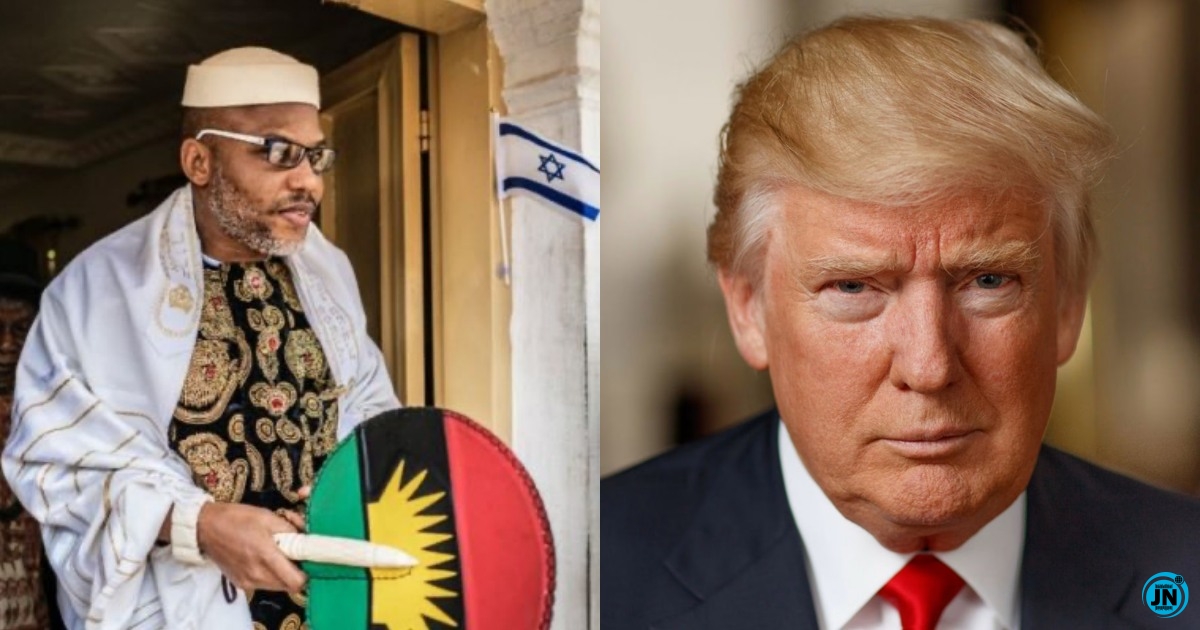
Several pro-Igbo diaspora organisations have stepped up their campaign for justice in the case of Mazi Nnamdi Kanu, the detained leader of the Indigenous People of Biafra (IPOB), by submitting a strongly worded petition to the United States President, Donald Trump. The groups are demanding that Washington impose sanctions on five Nigerian judges as well as a former Attorney General of the Federation (AGF) who served under ex-President Muhammadu Buhari’s administration, accusing them of complicity in severe human rights violations tied to Kanu’s detention and trial.
The petition, dated August 28, 2025, was prepared and submitted by Kanu’s international counsel, Bruce Fein, acting on behalf of the American Veterans of Igbo Descent (AVID), Rising Sun Charities Organization, and Ambassadors for Self-Determination. According to the petitioners, these judicial officers and the former AGF facilitated, enabled, or endorsed a series of unlawful actions, including Kanu’s abduction, his extraordinary rendition from Kenya to Nigeria, and his prolonged incarceration without fair trial guarantees.
The petitioners called on the United States government to invoke the provisions of the Global Magnitsky Human Rights Accountability Act, 22 U.S.C. 10102 (c), as well as Executive Order 13818, to hold the implicated Nigerian officials accountable. They stressed that the targeted sanctions should include visa restrictions, asset freezes, and travel bans to send a strong message that violations of internationally recognized human rights will not be tolerated.
In their detailed submission, the organisations argued that “Nigerian Justices and the former Attorney General deserve Global Magnitsky sanctions for systematically violating Mazi Nnamdi Kanu’s rights to free speech, free association, and fair trial, while criminalising his peaceful call for a referendum on Biafra’s right to self-determination as recognized under international law.”
The petition accused the jurists of deliberately legitimising arbitrary detention, issuing and upholding ex parte orders that proscribed IPOB without due process, and repeatedly denying Kanu access to legal representation and necessary medical treatment. According to the groups, these actions represent a clear pattern of judicial complicity in executive overreach and suppression of dissenting voices in Nigeria.
To strengthen their case, the petitioners drew parallels with international precedents. They cited the prosecution of Nazi judges at the Nuremberg Trials for enabling sham trials under Adolf Hitler’s regime and the more recent sanctions imposed by the US government in December 2024 against Russian judge Olesya, who was found guilty of participating in the arbitrary detention of Moscow city councillor and human rights defender, Alexi Gorniov. The petition stressed that “Judges enjoy no immunity for gross violations of internationally recognized human rights” and insisted that Nigeria’s judiciary should face similar consequences.
The diaspora groups also condemned Kanu’s protracted ordeal, recalling the 2015 military invasion of his family home in Umuahia, Abia State, during which dozens of Biafra agitators were killed. They maintained that Kanu’s continued detention and prosecution represent a direct violation of his rights under international law and that his call for a referendum was a legitimate democratic demand that should not have been criminalised.
They argued that the persecution of Kanu was emblematic of a broader assault on the right to self-determination in Nigeria and highlighted the chilling effect it has had on other human rights activists and groups advocating for political reform. The petitioners said the silence of the international community in the face of such abuses would embolden authoritarian practices in Africa’s most populous nation.
Finally, the petition urged the United States to remain consistent with its long-standing record of imposing sanctions on foreign officials involved in gross human rights abuses. The organisations insisted that only by taking decisive action can Washington demonstrate its commitment to justice, strengthen accountability within Nigeria’s judiciary, and ensure that Kanu receives fair treatment under both Nigerian and international law. They stressed that the imposition of sanctions would not only deliver justice for Kanu but also serve as a deterrent against future violations by judicial officers and political leaders in the country.